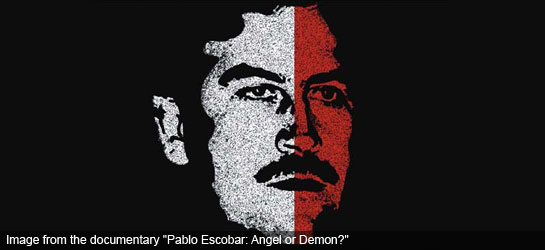
The last phone call Colombian drug lord Pablo Escobar made before he was gunned down on a Medellin rooftop was to his son, and many thought Juan Pablo Escobar would follow in his father’s footsteps.
But 16 years later, he is asking his father’s victims for forgiveness by appearing in a documentary that premiers this week at Argentina’s Mar del Plata film festival.
Juan Pablo Escobar fled Colombia in 1994, a year after his infamous father was shot dead by security forces. Since then has led a quiet life as an architect in Buenos Aires under the name Sebastian Marroquin.
“As members of the Escobar family, we have to accept responsibility for what happened and ask for forgiveness for everything Colombia suffered because of my father’s crimes,” Marroquin told Reuters.
Marroquin, 32, said he decided to throw off the veil of anonymity in an effort to bring reconciliation to his homeland, where security forces continue to battle cocaine-smuggling gangs who stepped in to fill the void left by the big cartels of the 1980s and 1990s.
In the film “Sins of my Father,” Marroquin tells the story of the drug lord and meets the sons of two of his most high-profile victims: former Justice Minister Rodrigo Lara Bonilla and presidential candidate Luis Carlos Galan.
Lara and Galan dared to confront Escobar about his drug smuggling, and paid with their lives. Galan’s oldest son said meeting Escobar’s son in Bogota had helped his family find closure.
“We felt very nervous and uncomfortable at first … but in the end we felt relieved and freed from feelings of anger,” Claudio Galan explained. “We thank him for this.”
Powerful criminal
Pablo Escobar was the boss of one of the world’s most powerful criminal organizations and Colombia’s most-wanted fugitive.
Thousands of people were killed in violence unleashed by his Medellin cartel. Escobar’s fortune reached more than $3 billion, according to Forbes.
The film gives a glimpse into Escobar’s family life, with Marroquin recalling how the cocaine kingpin read bedtime stories to his younger sister and taught him to ride a bike.
He also describes the family’s multimillion dollar homes, the trips around the world, and how his father selected had more than 200 exotic animals flown to his ranch, Hacienda Napoles.
“I felt like I had been born in Disneyland and I enjoyed all that magic, but it didn’t last,” he said.
Everything changed when Escobar ordered Lara’s killing. The next day the family escaped to Panama and later went into hiding in Honduras.
When they returned to Colombia they feared they would be kidnapped or killed by the drug lord’s many enemies. Marroquin said life became unbearable as security forces tightened the net around him in the years before his killing.
During one raid, the family was forced to live off a pot of tripe that was going moldy for more than a week despite having $2 million in cash stuffed into their luggage.
“It made you realize drug money can’t save you,” Marroquin said. “We were starving with $2 million next to us and we couldn’t even buy a pound of rice.”
A tough state crackdown has improved security in Colombia in recent years, but murders and kidnappings linked to the drugs business continue to plague the world’s top cocaine supplier more than 15 years after Escobar’s death.
Marroquin hopes the movie will foster dialogue in the Andean nation.
“There’s a point where preserving my life isn’t as important as fighting for something larger,” Marroquin said. “I might be a dreamer, but I’ve done this because of that conviction.” (Reuters)

